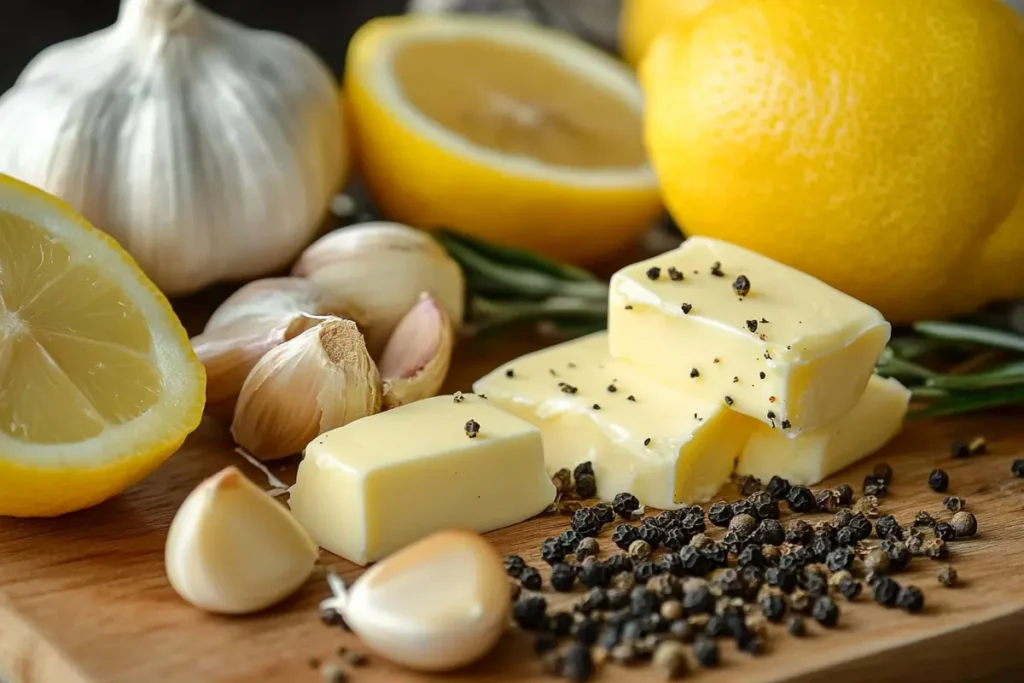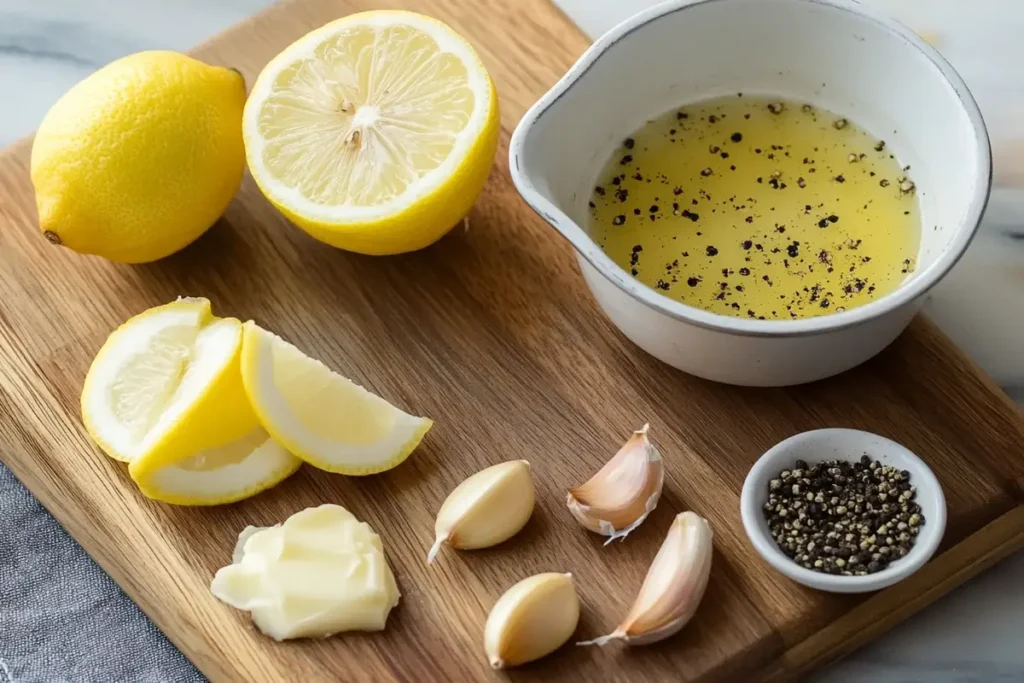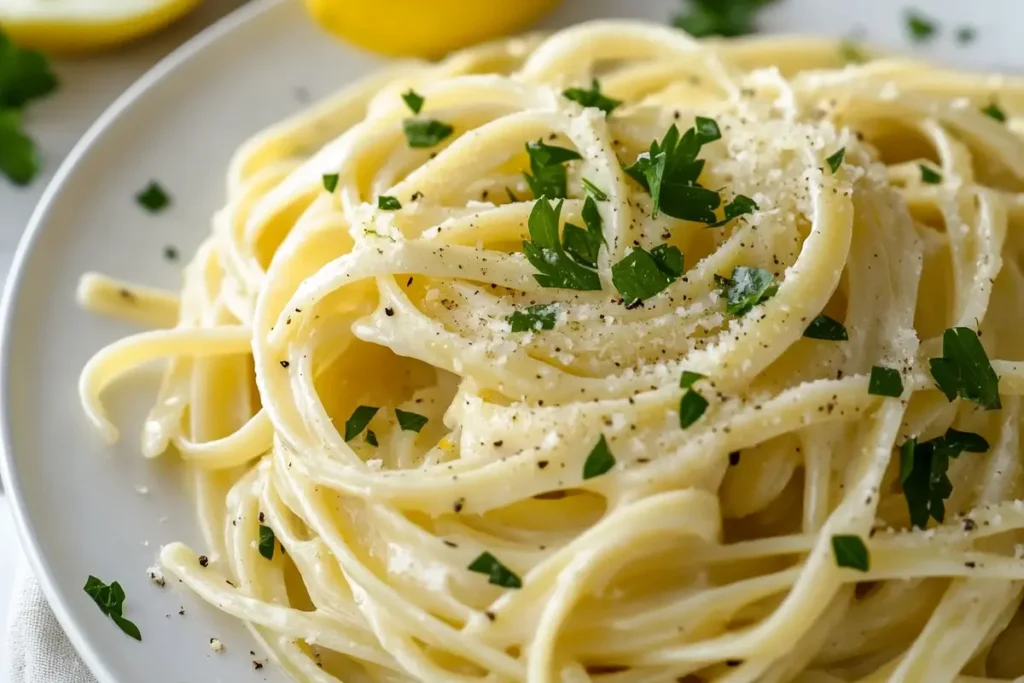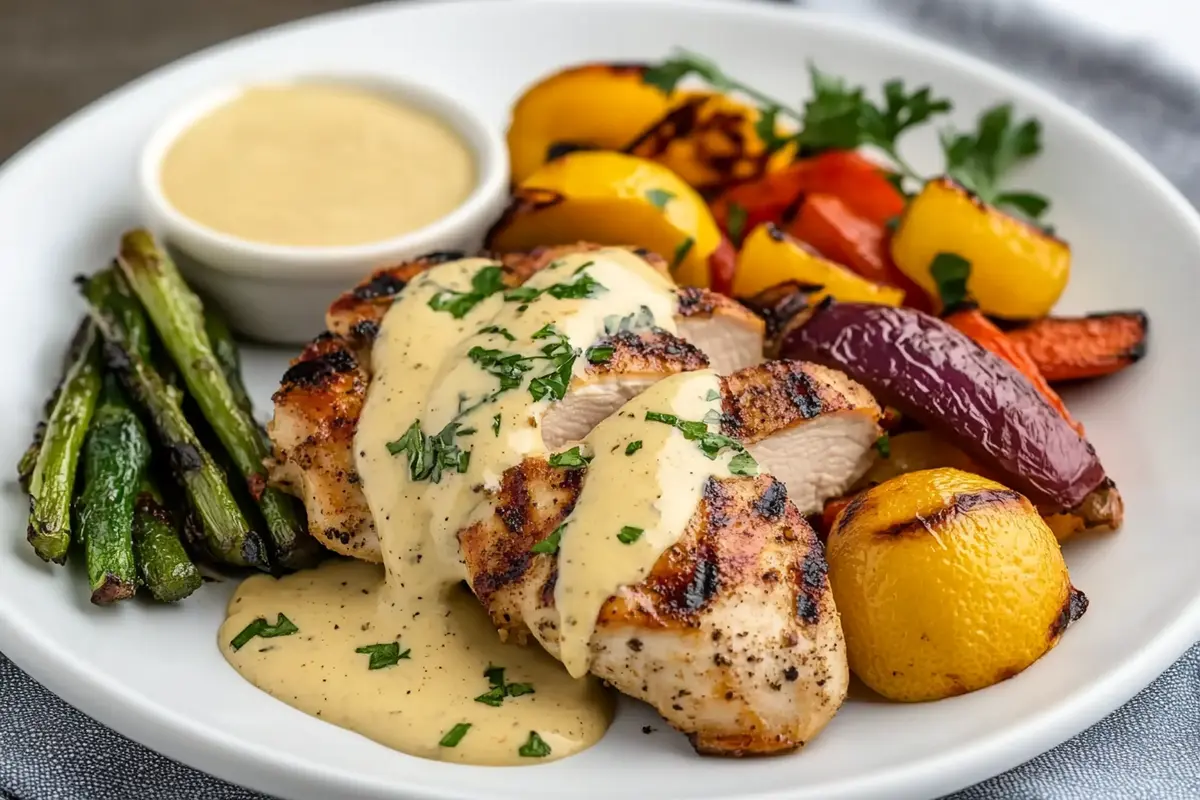Lemon pepper sauce is a culinary gem that balances tangy citrus with the bold kick of black pepper, making it a versatile companion for countless dishes. Whether you’re whipping up a quick weeknight dinner or experimenting with gourmet recipes, this zesty sauce adds flavor and flair to any meal. In this article, we’ll explore everything you need to know about lemon pepper sauce, from its origins and preparation to its many variations and uses. So, grab your apron, and let’s dive in!
Discovering the Zesty Delight of Lemon Pepper Sauce
What is Lemon Pepper Sauce?
This zesty condiment is a harmonious blend of citrus tang and peppery heat, perfect for elevating a variety of dishes. It combines the bright acidity of fresh lemons with the warm kick of cracked black pepper, often balanced with butter or oil for a silky texture.
Whether you drizzle it over roasted vegetables, use it as a marinade, or toss it with pasta, this versatile mixture transforms simple meals into something special. Its ability to complement both mild and bold flavors ensures its place in the hearts of home cooks and chefs alike.
The Origins and History of Lemon Pepper Sauce
Although the exact origins of lemon pepper sauce remain unclear, it’s widely believed to stem from the popularity of lemon pepper seasoning, a classic blend of dried lemon zest, cracked black pepper, and salt. This seasoning was first popularized in European and Mediterranean cuisines, where the marriage of citrus and spices is a time-honored tradition.
Over time, chefs and home cooks alike began experimenting with ways to transform the dry mix into a sauce. By adding butter or oil to emulsify the flavors, they successfully created a smooth, velvety condiment. Furthermore, this versatile creation proved perfect for enhancing everything from poultry to seafood. Today, it has become a global favorite, not only because of its adaptability but also due to its unmistakable zing.
What is Lemon Pepper Sauce?
At its core, this tangy blend is a delightful concoction that seamlessly melds the zing of lemon juice with the bold bite of freshly cracked black pepper. Moreover, it’s adored for its remarkable ability to transform even the simplest dishes into flavorful masterpieces. Typically made with fresh lemon zest, lemon juice, butter or oil, and often enhanced with a touch of garlic or herbs, it is as versatile as it is delicious.
What sets lemon pepper sauce apart is its perfect harmony of flavors. The citrus offers a refreshing, bright tanginess, while the pepper provides warmth and a touch of spice. Many recipes add a creamy texture with butter or even dairy-free alternatives for those pursuing plant-based options. It’s this adaptability that has cemented lemon pepper sauce as a kitchen staple, whether you’re cooking for a family dinner or preparing a gourmet spread.
Interestingly, this sauce isn’t just limited to enhancing meats like chicken or fish. In fact, it also works wonderfully on roasted vegetables, seamlessly blends into pasta, and can even be drizzled over freshly baked bread for a delightful touch. Additionally, its remarkable ability to complement such a wide array of dishes ensures that it remains a beloved choice not only for home cooks but also for professional chefs alike.
The Origins and History of Lemon Pepper Sauce
The exact origins of this zesty sauce are unclear but tied to the popularity of citrus-based seasonings. Lemon pepper seasoning, a blend of dried zest and coarse black pepper, became popular in European and Mediterranean cuisine. Its bright citrus flavors paired beautifully with herbs and spices.
Lemon has long symbolized freshness and vitality in many cultures. It’s a key ingredient in marinades, dressings, and sauces. Black pepper, known as the “king of spices,” enhances lemon’s sharp acidity. Together, they create a timeless combination. Initially used as a dry seasoning for meats and seafood, cooks later transformed it into a liquid sauce, adding depth and versatility to their dishes.
Fast forward to modern times, and lemon pepper sauce has undoubtedly become a go-to condiment in kitchens around the globe. Moreover, from casual dinners to high-end restaurants, its bold yet balanced flavor profile continues to captivate and win the hearts of food enthusiasts everywhere. As a result, it has firmly established itself as a staple in both home cooking and gourmet cuisine.
Key Ingredients in Lemon Pepper Sauce

The ingredients for this tangy and peppery mix are simple yet impactful. Here’s what you’ll need for the classic version:
- Fresh Lemons: The star of the show, fresh lemons provide both juice and zest, delivering the signature tangy brightness of the sauce.
- Cracked Black Pepper: Opt for freshly ground pepper, as it offers a more robust and aromatic punch compared to pre-ground varieties.
- Butter or Oil: These fats act as a base, creating a smooth and creamy texture that carries the other flavors.
- Garlic: While optional, garlic adds depth and a subtle kick that complements the citrus and spice.
- Seasonings and Herbs: Additional seasonings like salt, parsley, or thyme can enhance the flavor profile, adding layers of complexity.
Every ingredient serves a purpose, coming together to form a sauce that’s bold yet perfectly balanced.
Selecting Fresh Lemons for Optimal Flavor
To achieve maximum flavor, choose ripe, heavy lemons with smooth, bright skin. These are loaded with juice and essential oils, which give the mixture its vibrant tang. Organic options are ideal, especially for zesting, as they are free of wax and pesticides.
Choosing the Right Pepper for Your Sauce
The pepper you choose can significantly impact the sauce’s flavor. Freshly cracked black pepper is ideal, offering a bold and aromatic kick that pre-ground pepper simply can’t match.
For an extra layer of complexity, consider using a mix of black, white, and pink peppercorns. Grinding them fresh ensures you capture their full flavor, making your lemon pepper sauce truly unforgettable.
The Role of Butter and Other Fats in the Sauce
Butter is often the go-to fat for lemon pepper sauce, providing a rich, velvety texture and enhancing the overall flavor. However, for those seeking a dairy-free option, olive oil or vegan butter works wonderfully as a substitute.
Using a mix of fats, like butter and olive oil, can also add depth and balance. Fats help to emulsify the sauce, ensuring the lemon juice and other ingredients combine smoothly without separating.
Step-by-Step Guide to Making Homemade Lemon Pepper Sauce
Essential Tools and Equipment
Before diving into the recipe, gather these tools to make the process seamless:
- A microplane or zester for finely grating lemon zest.
- A citrus juicer to extract every last drop of juice.
- A saucepan or skillet for cooking the sauce.
- A whisk or spoon for stirring and emulsifying the ingredients.
- A pepper grinder for freshly cracking peppercorns.
Having the right equipment on hand ensures the preparation process is efficient and enjoyable.

Detailed Preparation Instructions
- Zest and Juice the Lemons: Start by zesting the lemons using a microplane. You’ll need about 1 tablespoon of zest for a small batch. Juice the lemons, aiming for about 3 tablespoons of fresh juice.
- Melt the Butter: In a saucepan over medium heat, melt 4 tablespoons of butter (or your chosen fat) until it begins to foam.
- Add Garlic: If using garlic, mince one clove finely and sauté it in the melted butter for 30 seconds, just until fragrant.
- Incorporate Lemon Juice and Zest: Pour in the lemon juice and add the zest, stirring to combine. Let it simmer gently for 1–2 minutes.
- Season with Pepper and Herbs: Add 1 teaspoon of freshly cracked black pepper and a pinch of salt. Stir in any additional herbs like parsley or thyme, if desired.
- Simmer and Adjust: Allow the sauce to simmer for another minute, letting the flavors meld together. Taste and adjust seasoning as needed.
- Serve or Store: Use immediately as a topping or dipping sauce, or let it cool and store it in an airtight container in the fridge for later use.
Popular Variations of Lemon Pepper Sauce
While the classic lemon pepper sauce is a marvel on its own, experimenting with variations can unlock new dimensions of flavor. These adaptations cater to different preferences and dietary needs, ensuring there’s a version for everyone to enjoy.
Creamy Lemon Pepper Sauce
For a richer, velvety texture, you can easily transform this tangy blend into a creamy delight. By simply adding heavy cream or a plant-based alternative like coconut cream, the result becomes even more indulgent. Moreover, this version pairs beautifully with pasta or grilled vegetables, enhancing their flavors effortlessly. Additionally, the creaminess works to balance the tangy and peppery notes, ultimately resulting in a luxurious sauce that is perfect for hearty and satisfying dishes.
To make it: Follow the basic recipe, but after adding the lemon juice and zest, stir in 1/4 cup of cream. Simmer until the mixture thickens slightly, and voilà—a decadent sauce ready to impress!
Spicy Lemon Pepper Sauce
For those who crave a kick, a spicy version of lemon pepper sauce is undoubtedly the way to go. By simply adding crushed red pepper flakes or a dash of hot sauce, you can effortlessly bring the heat while perfectly complementing the zesty and savory elements of the sauce. Moreover, this variation not only works wonders on wings and seafood but also shines as a dipping sauce for fries, making it a versatile addition to your culinary repertoire
To make it: Stir in 1/2 teaspoon of red pepper flakes or a few drops of your favorite hot sauce during the simmering process. Adjust the spice level to suit your taste.
Culinary Applications of Lemon Pepper Sauce
The versatility of lemon pepper sauce is one of its greatest strengths. Its bold yet balanced flavor makes it a perfect companion for a variety of dishes, transforming everyday meals into extraordinary culinary experiences.
Enhancing Chicken Dishes
One of the most popular ways to enhance chicken dishes is by using a tangy, pepper-infused glaze or marinade. Whether you’re grilling, baking, or pan-frying, this flavorful blend brings a delightful balance of zest and spice to your meals. Simply drizzle it over cooked chicken breasts, toss it with wings, or use it as a marinade for thighs to create a dish bursting with bold, savory notes in every bite.
Pairing with Seafood
The bright, zesty flavors of lemon pepper sauce make it a natural match for seafood. From shrimp and scallops to salmon and cod, the sauce enhances the delicate flavors of fish and shellfish. A light coating of the sauce can elevate a simple fillet, while a generous drizzle over grilled shrimp adds an irresistible finishing touch.
Vegetarian and Vegan Options
Veggie enthusiasts have plenty to celebrate. In fact, this zesty, peppery blend effortlessly enhances the flavor of many plant-based dishes. For instance, you can toss it with roasted broccoli or asparagus to add a tangy kick. Additionally, it works wonderfully when drizzled as a dressing over a warm grain bowl. You can also stir it into vegan pasta for a satisfying, dairy-free meal. Furthermore, for extra creaminess, consider using a vegan butter substitute. Altogether, this makes it a versatile option that everyone at the table can thoroughly enjoy.
Nutritional Breakdown
Understanding the nutritional profile of lemon pepper sauce helps you enjoy it while being mindful of your dietary goals. The exact nutritional values may vary depending on the ingredients and quantities used, but a typical homemade serving (about 2 tablespoons) generally includes the following:
- Calories: Approximately 80–100 calories, primarily from the fat content of butter or oil.
- Fat: About 8–10 grams, with unsaturated fats from olive oil or saturated fats from butter.
- Carbohydrates: Around 1–2 grams, mainly from lemon juice and optional sweeteners.
- Protein: Minimal, usually less than 1 gram.
- Vitamin C: Thanks to the fresh lemon juice, the sauce provides a small boost of this immune-boosting antioxidant.
For those using reduced-fat or vegan alternatives, the calorie and fat content will be lower. Store-bought versions of lemon pepper sauce may contain added sugars or preservatives, so always check the nutritional label.
Nutritional Information (per 100g)
| Nutrient | Amount |
|---|---|
| Calories | 80 kcal |
| Fat | 8.5 g |
| Saturated Fat | 5.5 g |
| Carbohydrates | 1.5 g |
| Fiber | 0.2 g |
| Sugars | 0.5 g |
| Protein | 0.2 g |
| Sodium | 200 mg |
| Vitamin C | 30 mg |
Health Benefits and Considerations
Not only does lemon pepper sauce pack a flavor punch, but it also offers some surprising health benefits. Thanks to its key ingredients, it can complement a balanced diet while adding zest to your meals.
Health Benefits:
- Rich in Antioxidants: Lemons are packed with vitamin C and flavonoids, which support immune health and combat free radicals.
- Digestive Aid: The acidity of lemon juice may help stimulate digestion, especially when paired with a meal.
- Heart-Friendly Fats: Using olive oil in the sauce provides healthy monounsaturated fats, known to promote heart health.
Considerations:
While delicious, lemon pepper sauce should be enjoyed in moderation if you’re watching your fat or calorie intake, particularly when made with butter. To reduce sodium levels, opt for unsalted butter or limit added salt. For those with specific dietary needs, the sauce is easy to adapt—using vegan butter for plant-based diets or low-fat options for calorie-conscious eaters.
By keeping these factors in mind, you can enjoy lemon pepper sauce guilt-free while reaping its culinary and nutritional benefits.
FAQs about Lemon Pepper Sauce
Lemon pepper sauce often inspires curiosity, especially for its versatility and flavor. Below are answers to some of the most commonly asked questions, designed to make your experience with this sauce even better.
How do you make lemon pepper sauce for wings?
Making lemon pepper sauce for wings is easy and results in a finger-licking flavor:
- Prepare the Sauce: In a small saucepan, melt 4 tablespoons of butter, then stir in 2 tablespoons of fresh lemon juice, 1 teaspoon of lemon zest, and 1 teaspoon of cracked black pepper.
- Toss the Wings: Coat freshly baked or fried wings with the warm sauce for a tangy and peppery glaze.
- Add a Finishing Touch: Sprinkle with parsley or a pinch of garlic powder for extra flavor.
This method creates the perfect balance of citrus and spice to complement the crispy wings.
Can I make lemon pepper sauce ahead of time?
Yes, you can prepare lemon pepper sauce ahead of time. Once made, let the sauce cool to room temperature and store it in an airtight container in the refrigerator for up to 5 days. Reheat gently on the stove or in the microwave before using, stirring well to recombine any separated ingredients.
Is lemon pepper sauce gluten-free?
Yes, lemon pepper sauce is naturally gluten-free when made with fresh, whole ingredients like lemon juice, butter, and black pepper. However, if using store-bought ingredients or pre-mixed seasoning blends, check the label to ensure they’re certified gluten-free, as some may include additives or fillers containing gluten.
What dishes pair well with lemon pepper sauce?
Lemon pepper sauce pairs beautifully with a variety of dishes, including:
- Chicken: Use it as a marinade, glaze, or dipping sauce for grilled or baked chicken.
- Seafood: Drizzle over salmon, shrimp, or cod for a bright, tangy finish.
- Vegetables: Toss roasted broccoli, asparagus, or zucchini in the sauce for a flavorful side dish.
- Pasta: Mix with cooked pasta for a quick and zesty meal.
Its versatility makes it an excellent choice for adding flavor to your favorite recipes.

Can I freeze lemon pepper sauce?
Yes, you can freeze it. Allow it to cool completely, then transfer it to a freezer-safe container or bag. It can be frozen for up to 3 months. To use, thaw in the refrigerator overnight and reheat gently, stirring to restore its smooth texture.
This makes it easy to have your favorite sauce on hand for quick meals and culinary inspiration.
Embracing the Versatility of Lemon Pepper Sauce in Your Culinary Adventures
Lemon pepper sauce is more than just a condiment; it’s a transformative element in any dish, bringing a perfect balance of tangy citrus and spicy warmth. From enhancing grilled chicken and seafood to adding a zesty touch to vegetables and pasta, its versatility knows no bounds.
With its simple ingredients and adaptability to various dietary preferences, this sauce is a staple worth mastering. Whether you’re experimenting with creamy or spicy variations, preparing it ahead of time, or pairing it with creative dishes, the possibilities are endless.
So, the next time you’re looking to elevate your meals, let lemon pepper sauce take center stage. It’s a culinary adventure waiting to happen, and every drizzle, toss, or dip is a testament to the magic of this zesty favorite.

